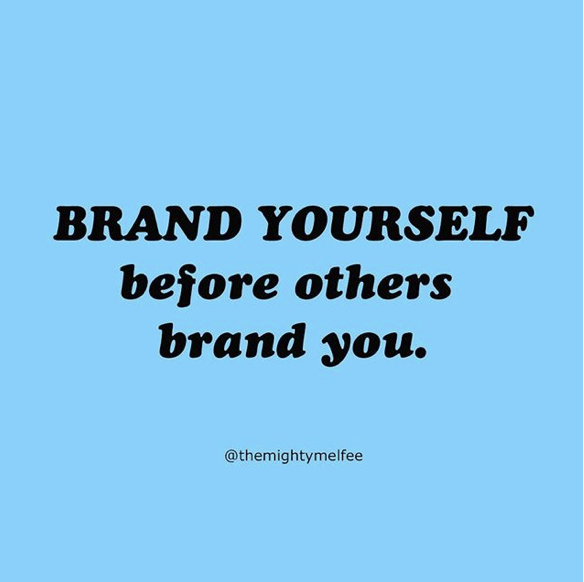BUILD A BRAND THAT STANDS OUT
Should You Build a Business Brand or Personal Brand for Your Online Services?
by Mel Fee
THE BLOG
Our online business tips
Hey, I’m Mel Fee
Brand and Marketing Strategist
for female entrepreneurs
Although I can help you with both, branding and marketing are two separate activities. Understanding how to use them together is crucial to build your online business for scale.
As I explained above, branding is defining WHO and WHAT your brand is whereas marketing defines HOW to create awareness and drive traffic to it.
They work hand-in-hand but you need to be clear on the difference so you can plan both effectively.
Still unsure?
Think of branding as your bread and marketing as your marmelade. You need branding first before applying marketing.
One of the first decisions you need to take when starting your online business is choosing between a personal brand and a business brand.
But first, let’s define both.
1 - What is a business brand?
A business brand is the connection that exists between your customers and the identity you build for your business. You would create a specific name for your business independent of your own name. Usually, people don’t tend to see who is personally behind the brand but they do form an attachment to the brand values and its messaging.
A few business brand names that come to mind are Apple, Innocent or Zara but it doesn’t have to be reserved to huge companies with many employees.
2 - What is a personal brand?
What to consider when building a business brand:
Business Brand cons:
- Time and money investment: Building and maintaining an emotional connection between a ‘faceless’ brand and an audience can take a while. It requires more marketing efforts and advertising budget to be recognised and remembered.
- Less room for expansion: Deciding to create unrelated offers or changing your audience can become a slippery slope if you have a business brand. You might end up having to create a separate brand, which will involve additional resources.
Business Brand pros:
- Building a business brand from scratch forces you to think strategically: No room for lucky guesses, you have to start market research from the get-go if you want to craft a name that aligns with your target audience and ambitions. It also helps you step back for a second and think deep about your business objectives, brand vision and what you will put in place to get there.
- Easier to maintain brand equity: There is no crossover or brand contamination if you or one of your staff’s reputation is on the line.
- Exit strategy: in case you decide to move onto a new venture or stop working altogether, owning a brand that is not associated with your name gives you the freedom to resell it at any stage.
What to consider when building a personal brand:
Personal brand cons:
- The proof is NOT in the pudding (or in your name): Because you’re using your own name, it won’t be obvious to people to understand what it is you do. Unless you use a tagline, you’ll have to keep hammering your message until your audience associate your personal name with your area or expertise.
Note: This can be true for non-descriptive business brand names too.
- All eyes on you: Being the face of your business can be daunting for some. You have to get visible, show your face, engage with people and get personal, even vulnerable. You have to lead by example and faux-pas can be more easily noticed.
- Putting a self-branded business for sale is hard: Would you imagine a Gordon Ramsay cookbook without at least his face on it? Nope? Me neither. With a personal brand, because all the. value is being around a person, if you stop being involved, your business loses most, if not all its value. That is NOT the type of branded asset investors would flock to.
I know it’s hard to think of reselling if you’re still in your early stages but if the thought of selling your business at some point ever crossed your mind, it’s worth considering a business brand instead.

Personal brand pros
- Spotlight on your expertise: if you are a coach, consultant, creative, social media manager or run a service business online, building a personal brand is a perfect way to bring attention to your know-how and position yourself as an expert in your industry.
- Connect faster with your ideal clients: Having a personal Brand gives you the opportunity to express yourself beyond the scope of your offering. It allows you to showcase layers of your personality your ideal clients can relate to and foster a meaningful relationship your competition won’t be able to replicate.
- Personal brands are flexible. Because they are tied to your personality, your brand can naturally evolve with you along the years.
Let’s say you are a yoga instructor offering online classes but decide to now shift your focus towards interior design. You wouldn’t need to change your business name for selling different offerings.Your brand reputation would be transferred to your interior design business, giving your services more credibility from the get-go.
My two cents
There is no blanket solution and you have to choose what’s best for you depending on where you want to take your business moving forward.
If you are reading this, you are most likely a female entrepreneurs with a service-based online business. Because your business depends so heavily on your skills and personality, I would highly recommend to push your personal brand wether you own a business brand or not.
This way, you can either use your personal brand to quickly raise your profile as an expert in your field, or use it to build awareness and drive traffic to your business brand.
This is the happy medium I have personally chosen, using my personal brand (@themightymelfee) to spread the word about The Mighty Bunch.
I wanted to share my expertise and connect on a more deeper level with my clients through my personal brand, while creating a third space/community for them to network even when I’m not around.
Which option makes the most sense for your business ? Send me a message hello@themightybunch.com.
If you need more clarity on where to take your brand and want to establish a brand strategy that will make you stand out in your industry, check out my Standout Brand Strategy Session. You’ll feel a whole lot more confident showing up online and attracting clients to your online business.





